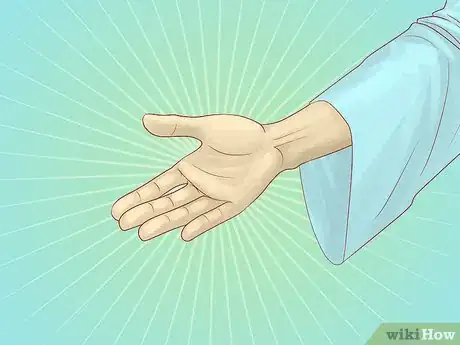wikiHow is a “wiki,” similar to Wikipedia, which means that many of our articles are co-written by multiple authors. To create this article, volunteer authors worked to edit and improve it over time.
wikiHow marks an article as reader-approved once it receives enough positive feedback. This article received 59 testimonials and 97% of readers who voted found it helpful, earning it our reader-approved status.
This article has been viewed 417,897 times.
Learn more...
Consecration is an important spiritual act, but even if you've heard the term before, you may not understand what it means if it has never been explained to you. Take a few moments to understand what the term means, then consider how to apply the practice to your own life.
Steps
Understanding Consecration
-
1Define "consecration." In a general sense, the term “consecration” refers to the act of dedicating oneself to a specific purpose or intention. To “consecrate” yourself essentially means to wholly dedicate yourself to something of greatest important.[1]
- When spoken plainly, however, "consecration" refers to the act of setting yourself aside and dedicating yourself to a deity, and that deity almost always refers to the God of Christianity.
- The term can also be used to refer to ordination into a sacred office. For most believers, however, it only refers to a basic, personal act of dedication.
- To “consecrate” something, one makes that thing holy or sacred. In that sense, the act of consecration can also be defined as the act of being made sacred.
-
2Consider its spiritual roots. As a religious practice, consecration dates as far back as the Old Testament. There are discussions about consecration in both halves of the Bible, in fact, and the practice is also frequently referred to by the Christian community of today.
- One of the earliest biblical references to the act of consecration can be found in Joshua 3:5. After wandering through the wilderness for 40 years, the people of Israel were commanded to consecrate themselves before entering the Promised Land. As this command was issued and followed, they were also assured that God would do great things and fulfill the promises He made to them.[2]
- The act of consecration is also referred to in the New Testament. In 2 Corinthians 6:17, God instructs his followers to "touch no unclean thing" and promises to receive them in response. Similarly, in Romans 12:1-2, Paul describes the necessity of viewing the body as a living sacrifice to God, set aside wholly for the worship of God and no longer for the ways of the world.
Advertisement -
3Understand God's role in consecration. God calls humanity to be consecrated to Him. The ability to consecrate yourself is only made possible by God, and the calling to do so comes directly from God.
- All holiness comes from God, and any holiness demonstrated by a human being is transferred to that person from God. Only God has the power to transform a human into something sacred, so in a sense, God is consecrating you—making you holy—once you decide to consecrate yourself.
- As the Creator, God wants each person to live in God's image and likeness. As such, God wants to dedicate each person to a sacred or consecrated life.
Consecrating Yourself to God
-
1Dedicate your heart to God. To consecrate yourself is to answer God's call to spiritual consecration. This means making a conscious, willing decision to dedicate your soul, mind, heart, and body to God.
- This decision must be one of will, intelligence, and affection. Only you can make the decision to consecrate yourself to God. No one else can push you into it.
-
2Reflect on your motives. Since consecration is something that must be done voluntarily, you need to ask yourself if you are truly dedicated or if you are caving into outward pressures.
- Only you and God know your heart, so don't worry about whether you appear to have the right motives.
- You should view your commitment to Christ as a priority, not a secondary option or passive experience.[3]
- You should also be able to feel gratitude and love in your heart for God. If your heart is ready to be consecrated to God, it will love God in response to the love God has for you.
-
3Repent. Repentance is one of the first acts you should undertake when you make the decision to consecrate yourself to God. The act of repenting involves the acknowledgment of your sins and the need for the salvation offered to you by Christ.
- Repentance is a personal experience, and it's also a fairly straightforward one. Upon gaining the desire to repent, all you need to do is pray for forgiveness and ask God to help you fight against temptation in the future.
-
4Be baptized. Water baptism is an outward sign of inner consecration. In being baptized, you are given a new spiritual life and dedicated to a life lived for the service of Christ.
- You should also take time to regularly renew your baptismal promises, especially if you were baptized as an infant before the decision was completely yours to make.
- Renewal of your baptismal promises can happen in several ways. Some denominations, like Roman Catholicism, have the Sacrament of Confirmation, in which you confirm your own intention to remain consecrated to God.
- Without a separate sacrament, you can still renew your baptismal promises by reciting a creed of faith or by regularly praying a personal vow to God about your desire and intention to remain consecrated.
-
5Separate yourself from the evils of the world. The physical body will always be drawn to the ways of the world, but consecrating yourself means prioritizing the spiritual life over the physical one.
- There are plenty of things in the physical world that are good. For instance, on a basic level, food is good because it provides the human body with the nourishment it needs to survive. There is nothing wrong with enjoying the food you eat, either.
- As a fallen world, though, even good things can be hijacked and used for ill purposes. Using food as an example, you can ruin your body by eating too much food, especially if you eat the wrong foods.
- Rejecting the evils of the world does not mean that you have to reject the good things of the world. It only means that you have to reject the bad side of worldly things. It also means that you have to accept that worldly things are significantly less important than spiritual things.
- On a practical level, this means rejecting things the world promotes when your faith tells you that those things are wicked. It also means following God's will for your life even when it seems to conflict with something neutral the world holds as a major priority—financial security, romantic love, etc. These “neutral” things can be good when used to serve God, but they are not to be prioritized over service to God.
-
6Draw closer to God. Rejecting the wicked ways of the world will not be enough to truly transform you. The human spirit always needs to "drink" from some source. If you do not drink from a worldly source, you must drink from a divine source.[4]
- Just as the body hungers for the ways of the world, the spirit thirsts of the ways of God. The more you train yourself to cave into the desire of your spirit, the easier it will become to continually turn to God.
- There are practical things you can do to draw closer to God. Regular prayer is one of the most important. Weekly worship at a church and study of the Scriptures are two other common and highly effective practices. Any activity that allows you to keep God as the focus of your life and encourages you to approach God can be used as a tool for that purpose.
-
7Stay committed. Consecration is not a single, one-time-only decision. It is a way of living. When you make the decision to consecrate yourself, you must be prepared to continue pursuing God for the rest of your life.
- Even though you can only draw near to God after consecrating yourself, your consecration will never be "complete." You will never achieve perfect righteousness.
- God does not demand complete perfection, though. You are only asked to make the commitment and to actively pursue it. You can stumble as you walk the path, but you must choose to keep walking even when you do.
Community Q&A
-
QuestionHow do a person's time, finances and talents relate to consecration?
 Community AnswerTime: Whatever we do, we must remember that the Holy Spirit lives in us; we need to stay in fellowship with Him always. Finances: If God owns our lives then He owns everything in our possession, including our hard-earned money. Talents: As stated above, all we have belongs to God; therefore we must glorify Him with whatever has been bestowed on us. We are stewards of all we have been given, and faithfulness is required in stewardship.
Community AnswerTime: Whatever we do, we must remember that the Holy Spirit lives in us; we need to stay in fellowship with Him always. Finances: If God owns our lives then He owns everything in our possession, including our hard-earned money. Talents: As stated above, all we have belongs to God; therefore we must glorify Him with whatever has been bestowed on us. We are stewards of all we have been given, and faithfulness is required in stewardship. -
QuestionWhat type of prayer topic can one pray?
 Community AnswerYou can pray about anything, whether it's something that worries you or things you are thankful for or anything else.
Community AnswerYou can pray about anything, whether it's something that worries you or things you are thankful for or anything else. -
QuestionHow do we meditate on the Word of God? What can we do while we fast?
 Community AnswerWe pray and seek directions from God. We read His word and then meditate on it. We ask ourselves what God is saying to us in each particular verse or passage of scripture
Community AnswerWe pray and seek directions from God. We read His word and then meditate on it. We ask ourselves what God is saying to us in each particular verse or passage of scripture
References
About This Article
If you want to consecrate yourself to God, make a conscious, willing, voluntary decision to dedicate your heart to Him. You should view your commitment to Christ as a priority and feel gratitude and love in your heart for God, so make sure you take a second to ask yourself if you're truly dedicated or simply giving into outward pressures. Once you're certain that you want to consecrate yourself, repent to God by acknowledging your sins and the need for the salvation offered by Christ. Then, either get baptized or renew your baptismal promises to mark the start of your new spiritual life. From here, draw closer to God by praying regularly, attending weekly worship, and studying the scriptures. For more tips, including how to stay committed to your new spiritual life, read on!










-Step-8-Version-3.webp)

-Step-10.webp)




















-Step-8-Version-3.webp)

-Step-10.webp)



































